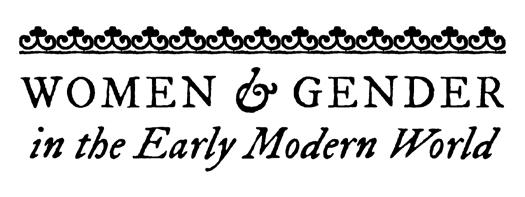
61 minute read
Scholarly
SCHOLARLY BOOKS







Daniel J. Burge is an associate editor at the Kentucky Historical Society.
MAY 282 pp. • 6 x 9 • 15 illustrations, index $60.00X • hardcover • 978-1-4962-2807-9 $76.00 Canadian / £48.00 UK
A Failed Vision of Empire
e Collapse of Manifest Destiny, 1845–1872
DANIEL J. BURGE
Since the early twentieth century, historians have traditionally de ned manifest destiny as the belief that the United States was destined to expand from coast to coast. is generation of historians have posed manifest destiny as a unifying ideology of the nineteenth century, one that was popular and pervasive and ultimately ful lled in the late 1840s when the United States acquired the Paci c Coast. However, the story of manifest destiny was never quite that simple.
In A Failed Vision of Empire Daniel J. Burge examines the belief in manifest destiny over the nineteenth century by analyzing contested moments in the continental expansion of the United States, arguing that the ideology was ultimately unsuccessful. By examining speeches, plays, letters, diaries, newspapers, and other sources, Burge reveals how Americans debated the wisdom of expansion, challenged expansionists, and disagreed over what the boundaries of the United States should look like. A Failed Vision of Empire is the rst work to capture the messy, complicated, and yet far more compelling story of manifest destiny’s failure, debunking in the process one of the most pervasive myths of modern American history.
“By shattering long-held notions that mid-nineteenth-century white Americans shared common commitment to their country’s territorial growth, Daniel Burge complicates stereotypes about U.S. imperialism while speaking to today’s nation disunited. His astute parsing of cartoons, literature, and political discourse makes for a lively, informative, and ultimately convincing read.”—Robert E. May, author of Manifest Destiny’s Underworld: Filibustering in Antebellum America
“New and important. . . . A Failed Vision of Empire provides a much wider framing of the concept of manifest destiny than most prior works, which in turn helps to dismantle it as the single explanatory framework often grafted onto the late 1840s and 1850s. Burge explores little-known episodes that will be valuable to not just specialists but more general historians.”—Thomas Richards Jr., author of Breakaway Americas: The Unmanifest Future of the Jacksonian United States
AMERICAN HISTORY / MILITARY STUDIES / WOMEN, GENDER & SEXUALITY Managing Sex in the U.S. Military
Gender, Identity, and Behavior
EDITED BY BETH BAILEY, ALESHA E. DOAN, SHANNON PORTILLO, AND KARA DIXON VUIC
e U.S. military is a massive institution, and its policies on sex, gender, and sexuality have shaped the experiences of tens of millions of Americans, sometimes in life-altering fashion. e essays in Managing Sex in the U.S. Military examine historical and contemporary military policies and o er di erent perspectives on the broad question: “How does the U.S. military attempt to manage sex?” is collection focuses on the U.S. military’s historical and contemporary attempts to manage sex—a term that is, in practice, slippery and inde nite, encompassing gender and gender identity, sexuality and sexual orientation, and sexual behaviors and practices, along with their outcomes. In each chapter, the authors analyze the military’s evolving de nitions of sex, sexuality, and gender, and the signi cance of those de nitions to both the military and American society.
“A creative, clear, and comprehensive approach to a topic fraught with long-standing and ongoing controversy. The authors capture the diversity and timeliness of the challenge. This is a must-read for those called to understand and manage sex in the U.S. military.” —Patricia M. Shields, editor in chief of Armed Forces and Society
“A pathbreaking book illuminating the history and context of today’s struggles for sexual and gender equity and safety in the U.S. military. . . . Managing Sex in the U.S. Military is essential for those who teach war and society, and gender and sexuality studies. A must-read for military members, leaders, policy makers, and elected o cials.”—Jennifer Mittelstadt, author of The Rise of the Military Welfare State
“Phenomenally important. . . . An invaluable collection of essays from eminent scholars that can help leaders prepare for higher levels of command and o er them perspective on vital topics a ecting organizational cohesion and morale.”—Gregory A. Daddis, author of Pulp Vietnam: War and Gender in Cold War Men’s Adventure Magazines Beth Bailey is Foundation Distinguished Professor in the Department of History and director of the Center for Military, War, and Society Studies at the University of Kansas. Alesha E. Doan is a professor in the School of Public A airs and Administration and in the Department of Women, Gender, and Sexuality Studies at the University of Kansas. Shannon Portillo is a professor in the School of Public A airs and Administration at the University of Kansas. Kara Dixon Vuic is the LCpl. Benjamin W. Schmidt Professor of War, Con ict, and Society in Twentieth-Century America at Texas Christian University.








MAY 378 pp. • 6 x 9 • Index $99.00X • hardcover • 978-1-4962-1902-2 $125.00 Canadian / £79.00 UK $30.00S • paperback • 978-1-4962-2988-5 $38.00 Canadian / £22.99 UK
Studies in War, Society, and the Military Kara Dixon Vuic and Richard S. Fogarty, series editors

Cattle Beet Capital

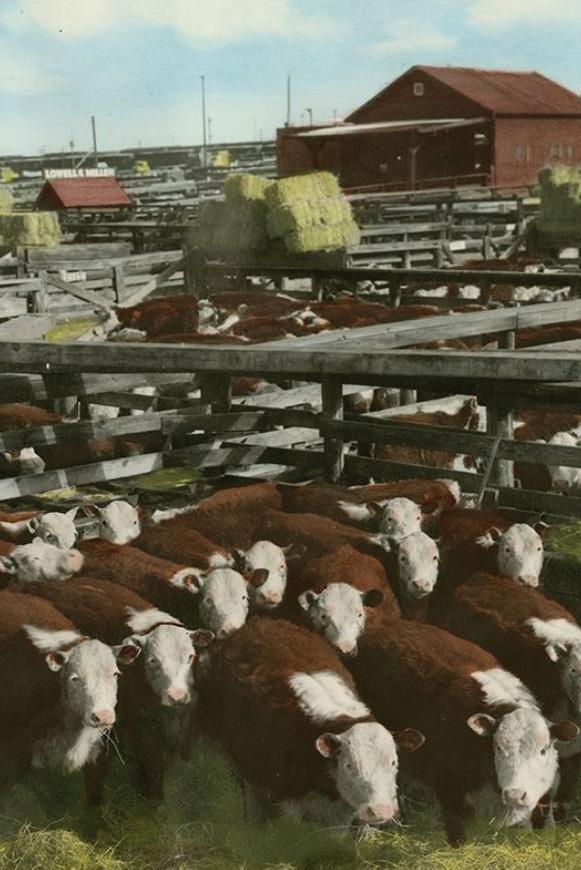
Making Industrial Agriculture in Northern Colorado
Michael Weeks
Michael Weeks is a lecturer of history at Utah Valley University.
JULY 358 pp. • 6 x 9 • 26 photographs, 5 illustrations, 6 maps, 1 chart, 6 graphs, index $60.00X • hardcover • 978-1-4962-0841-5 $76.00 Canadian / £48.00 UK
Cattle Beet Capital
MICHAEL WEEKS
In 1870 several hundred settlers arrived at a patch of land at the con uence of the South Platte and Cache la Poudre Rivers in Colorado territory. eir planned agricultural community, which they named Greeley, was centered around small landholdings, shared irrigation, and a variety of market crops. One hundred years later, Greeley was the home of the world’s largest concentrated cattle-feeding operation, with the resources of an entire region directed toward manufacturing beef. How did that transformation happen? Cattle Beet Capital is animated by that question.
Expanding outward from Greeley to all of northern Colorado, Cattle Beet Capital shows how the beet sugar industry came to dominate the region in the early twentieth century through a reciprocal relationship with its growers that supported a healthy and sustainable agriculture while simultaneously exploiting tens of thousands of migrant laborers. Michael Weeks shows how the state provided much of the sca olding for the industry in the form of tari s and research that synchronized with the agendas of industry and large farmers. e transformations that led to commercial feedlots began during the 1930s as farmers replaced crop rotations and seasonal livestock operations with densely packed cattle pens, mono-cropped corn, and the products pouring out of agro-industrial labs and factories. Using the lens of the northern Colorado region, Cattle Beet Capital illuminates the historical processes that made our modern food systems.
“This is an important story about the development of factory farming in the Colorado Piedmont in the 1920s, 1930s, and 1940s. One key intervention that Weeks makes is placing the story of the Colorado Piedmont at the center of the history about the growth of irrigated agribusiness in the West. Cattle Beet Capital makes important contributions to environmental history, agricultural history, and business history as well.”—Bartow J. Elmore, author of Citizen Coke: The Making of Coca-Cola Capitalism
“[Weeks] has uncovered loads of fascinating new material, especially from archives, that makes this story interesting and revealing. Cattle Beet Capital o ers a fresh and original story that should inspire others. This will make an important contribution to agricultural, environmental, and regional history.”—Deborah Fitzgerald, author of Every Farm a Factory: The Industrial Ideal in American Agriculture
Dirt Persuasion
Civic Environmental Populism and the Heartland’s Pipeline Fight
DEREK MOSCATO
Dirt Persuasion examines a watershed moment in U.S. environmental politics: the ght over the Keystone XL Pipeline. e complex interplay of resources extraction industries with grassroots environmentalism and advocacy has transformed the role of activists in the contemporary public sphere. Bold Nebraska’s years-long ght against pipeline company TransCanada provides a compelling case study: a contemporary state-level organization that simultaneously challenged political and business leaders in its home state of Nebraska, at the national level in the United States, and in the foreign jurisdiction of Canada.
Dirt Persuasion sheds light not only on the activism practices of social movements but also on the changing environments in which such actions are deployed. e KXL Pipeline ght represents a watershed moment not only for U.S. energy politics but also in the communication of environmental activism. e rural dimension of this environmental saga is critical: environmentalism must be understood from the perspective of the rural Americans who coexist with one of the planet’s most delicate ecologies. Populism, rhetorical appeals, strategic advocacy framing, and media framing all factor prominently within the pipeline debate—leading to a civic environmental persuasion built on the attributes of narrative, engagement, hyperlocalization, and bipartisanship in order to build broad stakeholder support and in uence public policy.
“TransCanada’s Keystone XL Pipeline is arguably one of the most significant environmental struggles in North American history. Moscato not only digs deep into these intense ecological antagonisms but—through the Bold Nebraska environmental campaign—also presents an important case study of the possibilities of engaged, multi-stakeholder environmental activism in a time of mounting global ecological crisis. . . . Dirt Persuasion is an exceptionally important contribution to environmental communication.” —Patrick D. Murphy, author of The Media Commons: Globalization and Environmental Discourses
“Dirt Persuasion is a must-read for grassroots activists who care about rural environments. Lucidly written, Moscato’s fascinating book illuminates how Bold Nebraska mobilized cultural symbols, storytelling, and historical consciousness to build uncommon alliances and frame the media narrative in a successful movement to halt construction of the Keystone XL Pipeline.”—Marsha Weisiger, Julie and Rocky Dixon Chair of U.S. Western History at the University of Oregon Derek Moscato is an associate professor of journalism at Western Washington University.








JUNE 252 pp. • 6 x 9 • 12 photographs, 2 illustrations, 2 maps, 2 tables, 10 graphs, index $60.00S • hardcover • 978-1-4962-0839-2 $76.00 Canadian / £48.00 UK








Mark T. Johnson is an assistant professor in the Institute of Educational Initiatives at the University of Notre Dame.
MAY 280 pp. • 6 x 9 • 24 photographs, 3 maps, 1 chart, appendix, index $55.00S • hardcover • 978-1-4962-3099-7 $69.50 Canadian / £44.00 UK
e Middle Kingdom under the Big Sky
A History of the Chinese Experience in Montana
MARK T. JOHNSON
From the earliest days of non-Native settlement of Montana, when Chinese immigrants made up more than 10 percent of the territory’s population, Chinese pioneers played a key role in the region’s development. But this population, so crucial to Montana’s history, remains underrepresented in historical accounts, and popular attention to the Chinese in Montana tends to focus on sensational elements—exoticizing Chinese Montanans and distancing their lived experiences from our modern understanding. e Middle Kingdom under the Big Sky seeks to recover the stories of Montana’s Chinese population in their own words and deepen understanding of Chinese experiences in Montana with a global lens.
Mark T. Johnson has mined several large collections of primary documents left by Chinese pioneers, translated into English here for the rst time. ese collections, spanning the 1880s through the 1950s, provide insight into the pressures the Chinese community faced—from family members back in China and from non-Chinese Montanans—as economic and cultural disturbances complicated acceptance of Chinese residents in the state. rough their own voices Johnson reveals the agency of Chinese Montanans in the history of the American West and China.
“Johnson’s transnational approach to his subject sets his work apart from most all other studies done on the Chinese experience in Montana. The author makes excellent use of primary sources, including materials that help to capture the Chinese voices in the story and have rarely, if ever, been utilized by other historians.” —Robert R. Swartout Jr., professor emeritus of history at Carroll College and coeditor of Montana Legacy: Essays on History, People, and Place
“The Middle Kingdom under the Big Sky fills a gap in the history of Montana as well as of Chinese immigration. . . . Joining a group of new scholars, Johnson takes a transnational approach in dealing with the topic and provides a good example of this new kind of scholarship.”—Liping Zhu, author of The Road to Chinese Exclusion: The Denver Riot, 1880 Election, and Rise of the West
AMERICAN HISTORY / RELIGION / AMERICAN WEST / MORMON Liverpool to Great Salt Lake
e 1851 Journal of Missionary George D. Watt
EDITED BY LAJEAN PURCELL CARRUTH AND RONALD G. WATT TRANSCRIPTION BY LAJEAN PURCELL CARRUTH INTRODUCTION BY FRED E. WOODS
George Darling Watt was the rst convert of the Church of Jesus Christ of Latter-day Saints baptized in the British Isles. He emigrated to Nauvoo, Illinois, in 1842. He returned to the British Isles in 1846 as a missionary, accompanied by his wife and young son. He remained there until 1851, when he led a group of emigrant converts to Salt Lake City, Utah. Watt recorded his journey from Liverpool to Chimney Rock in Pitman shorthand. Remarkably, his journal wasn’t discovered until 2001—and is transcribed and appearing for the rst time in this book.
Watt’s journal provides an important glimpse into the transatlantic nature of Latter-day Saint migration to Salt Lake City. In 1850 there were more Latter-day Saints in England than in the United States, but by 1890 more than eighty- ve thousand converts had crossed the Atlantic and made their way to Salt Lake City. Watt’s 1851 journal opens a window into those overseas, riverine, and overland journeys. His spirited accounts provide wide-ranging details about the births, marriages, deaths, Sunday sermons, interpersonal relations, weather, and food and water shortages of the journey, as well as the many logistical complexities.
“LaJean Purcell Carruth and Ronald G. Watt make mid-nineteenth-century pioneers speak as if ‘out of the dust,’ bringing us into contact with their hardships, humor, and faith.”—John G. Turner, author of Brigham Young: Pioneer Prophet
“Carruth and Watt expand greatly our understanding of the nineteenth-century Mormon experience, especially the emigrant trek to Utah, and the theology of Orson Pratt. Scholars and general readers alike will appreciate the book’s significance and substance.”—John Sillito, professor emeritus for libraries at Weber State University LaJean Purcell Carruth is a senior historian at the Church History Library in Salt Lake City. She is the coeditor of Mountain Meadows Massacre: Collected Legal Papers. Ronald G. Watt is retired after working thirty- ve years for the archives of the LDS Church Historical Department. He is the author of four books, including e Mormon Passage of George D. Watt: First British Convert, Scribe for Zion.








MAY 258 pp. • 6 x 9 • 5 photographs, 11 illustrations, 3 maps, 1 glossary, 5 appendixes, index $45.00S • hardcover • 978-1-4962-2987-8 $57.00 Canadian / £36.00 UK
“A delight. . . . Watt’s penchant for observing both the unusual and the mundane . . . make his journal a welcome addition to the migrant genre and an absolute pleasure to read.”—W. Paul Reeve, author of Religion of a Di erent Color: Race and the Mormon Struggle for Whiteness
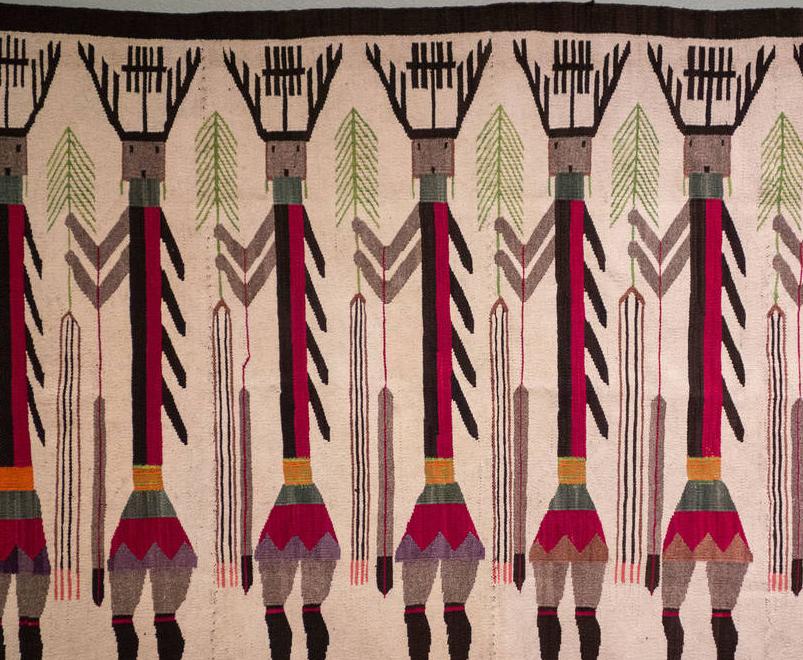

Regna Darnell is Distinguished University Professor Emerita of Anthropology at the University of Western Ontario. She is the coeditor of e Franz Boas Papers, Volume 1: Franz Boas as Public Intellectual— eory, Ethnography, Activism (Nebraska, 2015), the author of e History of Anthropology: A Critical Window on the Discipline in North America (Nebraska, 2021), and author or editor of many other works. Darnell is the recipient of the lifetime achievement award from the American Anthropological Association.
JUNE 318 pp. • 6 x 9 • 4 photographs, 4 tables, index $99.00X • hardcover • 978-1-4962-2416-3 $125.00 Canadian / £79.00 UK $30.00S • paperback • 978-1-4962-3130-7 $38.00 Canadian / £22.99 UK
History of eory and Method in Anthropology
REGNA DARNELL
Regna Darnell o ers a critical reexamination of the theoretical orientation of the Americanist tradition, centered on the work Franz Boas, and the professionalization of anthropology as an academic discipline in the United States in the late nineteenth and early twentieth centuries. History of eory and Method in Anthropology reveals the theory schools, institutions, and social networks of scholars and eldworkers primarily interested in the ethnography of North American Indigenous peoples. Darnell’s fty-year career entails foundational writings in the four elds of the discipline: cultural anthropology, ethnography, linguistics, and physical anthropology.
Leading researchers, theorists, and eldwork subjects include Claude Lévi-Strauss, Franz Boas, Benjamin Lee Whorf, John Wesley Powell, Frederica de Laguna, Dell Hymes, George Stocking Jr., and Anthony F. C. Wallace, as well as nineteenth-century Native language classi cations, ethnography, ethnohistory, social psychology, structuralism, rationalism, biologism, mentalism, race science, human nature and cultural relativism, ethnocentrism, standpoint-based epistemology, collaborative research, and applied anthropology. History of eory and Method in Anthropology is an essential volume for scholars and undergraduate and graduate students to enter into the history of the inductive theory schools and methodologies of the Americanist tradition and its legacies.
“Regna Darnell invites the reader to listen in on the intimate, collaborative, and frequently contentious conversations that formed the basis for North American anthropology. We are gifted with a clearly written and revelatory unpacking of the connections, alliances, and discordant moments of an anthropology practice grounded in humanistic and scholarly precepts. This timely critical history promises to reintroduce anthropology as a fundamentally humanistic scholarly endeavor whose practitioners continue the long tradition of scholarship in the service of social justice.”—Bernard Perley, author of Defying Maliseet Language Death: Emergent Vitalities of Language, Culture, and Identity in Eastern Canada
Critical Studies in the History of Anthropology Regna Darnell and Robert Oppenheim, series editors
Yukhíti Kóy
A Reference Grammar of the Atakapa Language
COMPILED BY GEOFFREY KIMBALL FROM THE FIELD NOTES OF ALBERT SAMUEL GATSCHET, PROVIDED BY KIŠYUC AND TOTTOKŠ
Geo rey Kimball presents the rst grammar of the American Indian language Yukhíti Kóy, better known in English as Atakapa, once spoken in coastal southwestern Louisiana and coastal eastern Texas. e late eighteenth and early nineteenth centuries saw a drastic fall in the Atakapa population, and by the rst decades of the twentieth century the Atakapa language ceased to be spoken. e grammar is based on the eld notes collected by Albert Samuel Gatschet in January of 1885, with additional material collected by John R. Swanton in 1907–8. Gatschet worked with two speakers of the language, Kišyuc, also known as Yoyot, and her cousin Tottokš, whose English names were Louison Huntington and Delilah Moss, respectively. John R. Swanton wrote a grammatical sketch of Atakapa in 1929 based on Gatschet’s notes and in 1932 published the texts Gatschet had gathered, as well as a dictionary. e materials, originally written phonetically, have been phonemicized, and the nature of the grammar has been elucidated. e nine surviving texts in Yukhíti have been phonemicized, analyzed, and translated, and the parallels between them and other traditional oral literatures of Native American languages of the Southeast are discussed. is reference grammar includes a vocabulary of all words contained in the eld notes.
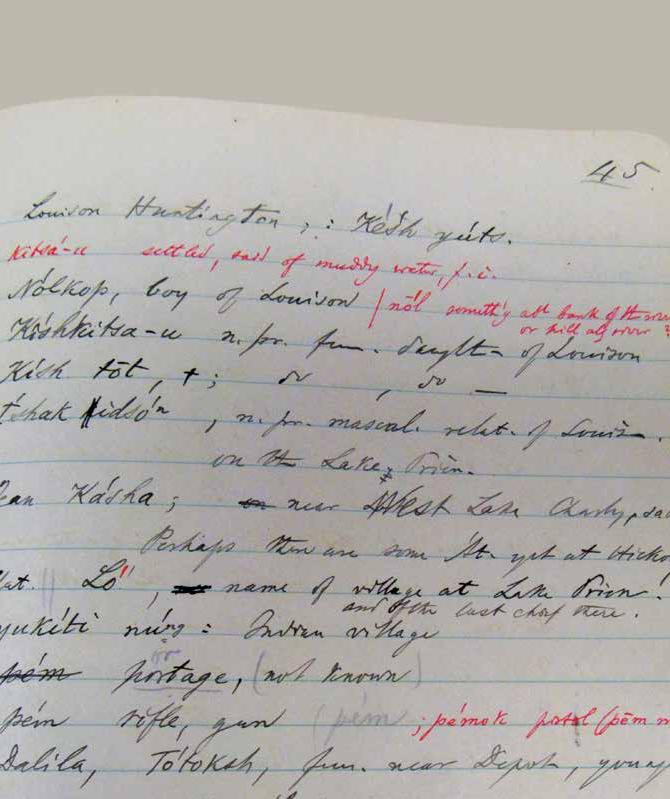
“There has not been a comprehensive reference grammar of the Atakapa language, and so this book fills a real need. There is very careful philological work here.”—George Aaron Broadwell, author of A Choctaw Reference Grammar
Yukhíti Kóy
A Reference Grammar of the Atakapa Language
Compiled by GEOFFREY KIMBALL From the field notes of Albert Samuel Gatschet, provided by Kišyuc and Tottokš
Geoffrey Kimball is a research associate in the Department of Anthropology at Indiana University. He is the author of Koasati Traditional Narratives (Nebraska, 2010), Koasati Dictionary (Nebraska, 1994), and Koasati Grammar (Nebraska, 1991).
AUGUST 276 pp. • 7 x 10 • 2 photographs, 2 tables, 3 appendixes, index $65.00X • hardcover • 978-1-4962-2966-3 $82.00 Canadian / £52.00 UK
“This reference grammar will make a huge and much-needed contribution to Atakapan language studies and to linguistics in general. Geo rey Kimball has clearly well researched the language based on both the original Gatschet field notes and the published Gatschet and Swanton Atakapa dictionary.”—David V. Kaufman, author of Clues to Lower Mississippi Valley Histories: Language, Archaeology, and Ethnography and Atakapa Ishakkoy Dictionary








John A. Goodwin teaches U.S. history at BASIS Phoenix in Arizona.
MARCH 270 pp. • 6 x 9 • 8 photographs, index $60.00X • hardcover • 978-1-4962-1561-1 $76.00 Canadian / £48.00 UK
Indigenous Education Margaret Connell Szasz, Brenda J. Child, Karen Gayton Comeau, John W. Tippeconnic III, and Matthew Sakiestewa Gilbert, series editors
Without Destroying Ourselves
A Century of Native Intellectual Activism for Higher Education
JOHN A. GOODWIN
Without Destroying Ourselves is an intellectual history of Native activism seeking greater access to and control of higher education in the twentieth century. John A. Goodwin traces themes of Henry Roe Cloud’s (Ho-Chunk) vision for Native intellectual leadership and empowerment in the early 1900s to the later missions of tribal colleges and universities (TCUs) and education-based, selfdetermination movements of the 1960s onward.
Vital to Cloud’s work was the idea of how to build from Native identity and adapt without destroying that identity. As the central themes of the movement for Native control in higher education developed over the course of several decades, a variety of Native activists carried Cloud’s vision forward. Goodwin explores how Elizabeth Bender Cloud (Ojibwe), D’Arcy McNickle (Salish Kootenai), Jack Forbes (Powhatan-Renapé, Delaware Lenape), and others built on and contributed to this common thread of Native intellectual activism.
Goodwin demonstrates that Native activism for selfdetermination was never snu ed out by the swing of the federal government’s pendulum away from tribal governance and toward termination. Moreover, e orts for Native control in education remained a vital aspect of that activism. Without Destroying Ourselves documents this period through the full accreditation of TCUs in the late 1970s and reinforces TCUs’ continuing relevance in confronting the unique needs and challenges of Native communities today.
“In the face of white colonialism, Native American leaders have long had to wrestle with the timeless question: how can we change without destroying ourselves? As John A. Goodwin demonstrates in this deeply researched and thoughtful study, answering this question has always been at the heart of Native intellectuals’ e orts to create a model of higher education both by and for Indians. To understand the multiple struggles they encountered in this journey—a journey in which the issues of power and purpose were central—this study is must-reading.”—David Wallace Adams, author of Education for Extinction: American Indians and the Boarding School Experience, 1875–1928
“Goodwin’s sympathetic and insightful history underscores the importance of tribal colleges and universities as intellectual spaces that are educating, decolonizing, and sustaining the tribal communities they serve. This book fills a gaping void in American Indian historiography and will undoubtedly transform how scholars think about Indian education.”—Bradley Shreve, editor of Tribal College Journal of American Indian Higher Education
Assimilation, Resilience, and Survival
A History of the Stewart Indian School, 1890–2020
SAMANTHA M. WILLIAMS
Assimilation, Resilience, and Survival illustrates how settler colonialism propelled U.S. government programs designed to assimilate generations of Native children at the Stewart Indian School (1890–1980). e school opened in Carson City, Nevada, in 1890 and embraced its mission to destroy the connections between Native children and their lands, isolate them from their families, and divorce them from their cultures and traditions. Newly enrolled students were separated from their families, had their appearances altered, and were forced to speak only English. However, as Samantha M. Williams uncovers, numerous Indigenous students and their families subverted school rules, and tensions arose between federal o cials and the local authorities charged with implementing boarding school policies. e rst book on the history of the Stewart Indian School, Assimilation, Resilience, and Survival reveals the experiences of generations of Stewart School alumni and their families, often in their own words. Williams demonstrates how Indigenous experiences at the school changed over time and connects these changes with Native American activism and variations in federal policy. Williams’s research uncovers numerous instances of abuse at Stewart, and Assimilation, Resilience, and Survival addresses both the trauma of the boarding school experience and the resilience of generations of students who persevered there under the most challenging of circumstances.
“Samantha Williams’s history of the Stewart Indian School is part of a new generation of research that brings laser focus to particular boarding schools and foregrounds their meaning to the students who attended them. . . . Williams also tells the significant story of Indigenous activists who fought to preserve Stewart’s buildings as a museum so this painful history will not be erased.”—Margaret Jacobs, author of A Generation Removed: The Fostering and Adoption of Indigenous Children in the Postwar World
“Samantha Williams has done an outstanding job of bringing to life the stories and experiences of the students who attended Stewart Indian School. This book is an important teaching tool to share the little-known history of U.S. boarding schools.”—Bobbi Rahder, museum director of the Stewart Indian School Cultural Center and Museum Samantha M. Williams is a writer and historian who focuses on the history of the Native American boarding school system. She earned a PhD in history from the University of California, Santa Cruz, and served as a research consultant for the Stewart Indian School Cultural Center and Museum.








MAY 342 pp. • 6 x 9 • 30 photographs, 9 tables, index $60.00S • hardcover • 978-1-4962-2336-4 $76.00 Canadian / £48.00 UK
Indigenous Education Margaret Connell Szasz, Brenda J. Child, Karen Gayton Comeau, John W. Tippeconnic III, and Matthew Sakiestewa Gilbert, series editors
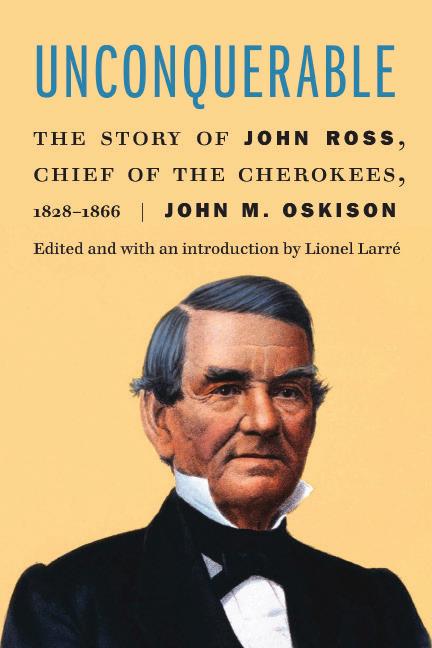
John M. Oskison (1874–1947) was a proli c Cherokee author, journalist, and activist. He published short stories and essays on Indian life at the turn of the twentieth century, novels about life in the Indian Territory, and biographies of Tecumseh and Sam Houston. Lionel Larré is the president of Bordeaux Montaigne University. He is the author of several books and the editor of Oskison’s Tales of the Old Indian Territory and Essays on the Indian Condition (Nebraska, 2012).
Unconquerable
e Story of John Ross, Chief of the Cherokees, 1828–1866
JOHN M. OSKISON EDITED AND WITH AN INTRODUCTION BY LIONEL LARRÉ
Unconquerable is John Milton Oskison’s biography of John Ross, written in the 1930s but unpublished until now. John Ross was principal chief of the Cherokees from 1828 to his death in 1866. rough the story of John Ross, Oskison also tells the story of the Cherokee Nation through some of its most dramatic events in the nineteenth century: the Nation’s di cult struggle against Georgia, its forced removal on the Trail of Tears, its internal factionalism, the Civil War, and the reconstruction of the nation in Indian Territory west of the Mississippi.
Ross remains one of the most celebrated Cherokee heroes: his story is an integral part not only of Cherokee history but also of the history of Indian Territory and of the United States. With a critical introduction by noted Oskison scholar Lionel Larré, Unconquerable sheds light on the critical work of an author who deserves more attention from both the public and scholars of Native American studies.
“Unconquerable helps us understand the career and contributions of a key figure in early twentieth-century Native American literature who is too often dismissed. Larré has become an authority on Oskison and his body of work, and this book further develops resources for those interested in this writer—and Cherokee and Oklahoma studies more broadly.”—Lindsey Claire Smith, author of Indians, Environment, and Identity on the Borders of American Literature: From Faulkner and Morrison to Walker and Silko
JUNE 298 pp. • 6 x 9 • 3 illustrations, index $99.00X • hardcover • 978-1-4962-3096-6 $125.00 Canadian / £79.00 UK $30.00S • paperback • 978-1-4962-3148-2 $38.00 Canadian / £22.99 UK
“Unconquerable is important on a number of levels. It o ers a welcome Cherokee perspective on John Ross and all of the crises he helped his nation negotiate. The editor makes it even more important by virtue of the introduction, which gives readers an opportunity to engage the politics of history writing.”—Daniel M. Cobb, author of Native Activism in Cold War America: The Struggle for Sovereignty
JOHN JOSEPH MATHEWS EDITED AND WITH AN INTRODUCTION BY SUSAN KALTER
Susan Kalter presents seventeen previously unpublished short stories by John Joseph Mathews and skillfully intertwines literary analysis, author biography, and archival research with his journals and personal correspondence. Mathews is considered one of the founders and shapers of the twentieth-century Native American novel, yet literary history has largely ignored his work.
An Osage writer from Oklahoma, Mathews also spent time in Los Angeles and Europe. e stories in this volume were written at the dawn of the nuclear age by an author who exposed the social dynamics of an emerging world order, an author who had also published explicitly about the ways he observed the East Coast establishment suppressing southwestern writers. is work shows us the aesthetics we missed out on as a result. Topics range from adulterous murder to Cherokee removal, from the thrill of the hunt to the cultural impasses between U.S. citizens in Mexico and their hosts, from the modern Middle East to the fantastical future. e stories bear the consciousness of a postwar world—its confusions and regrets, its orthodoxies and hypocrisies—as well as the mark of a practiced and proli c writer. e Short Stories of John Joseph Mathews, an Osage Writer sheds light on the complexity of Native American experiences of the last century and the ripple of these stories today.
“Susan Kalter’s work brings to life the wider world of Mathews beyond his well-known Osage works. . . . Mathews remains a towering figure, and the short stories will only add to his reputation.”—Blue Clark, professor of law at Oklahoma City University and author of Indian Tribes of Oklahoma: A Guide
“This book deftly weaves literary analysis, author biography, archival work, and historical context into literary recovery. . . . It is thoroughly researched and communicates that research in clear and accessible prose.”—Alyssa Hunziker, assistant professor of English at Oklahoma State University John Joseph Mathews (1895–1979) is the author of Wah’Kon-tah: e Osage and the White Man’s Road; Sundown; Talking to the Moon; Life and Death of an Oilman: e Career of E. W. Marland; e Osages: Children of the Middle Waters; Twenty ousand Mornings: An Autobiography; and a children’s book, Old ree Toes and Other Tales of Survival and Extinction. Susan Kalter is a professor of American literature and Native American studies at Illinois State University. She is the editor of Twenty ousand Mornings: An Autobiography and Old ree Toes and Other Tales of Survival and Extinction.








JUNE 304 pp. • 6 x 9 $99.00X • hardcover • 978-1-4962-3091-1 $125.00 Canadian / £79.00 UK $30.00S • paperback • 978-1-4962-3098-0 $38.00 Canadian / £22.99 UK








James L. Hill is a visiting assistant professor of history at the University of Pittsburgh.
JULY 332 pp. • 6 x 9 • 6 illustrations, 4 maps, 3 tables, index $65.00X • hardcover • 978-1-4962-1518-5 $82.00 Canadian / £52.00 UK
Borderlands and Transcultural Studies Paul Spickard, Rosalyn LaPier, and Rudy Guevarra Jr., series editors
JAMES L. HILL
Creek Internationalism in an Age of Revolution, 1763–1818 examines how Creek communities and their leaders remained viable geopolitical actors in the Trans-Appalachian West well after the American Revolution. e Creeks pursued aggressive and far-reaching diplomacy between 1763 and 1818 to assert their territorial and political sovereignty while thwarting American e orts to establish control over the region. e United States and the Creeks fought to secure recognition from the powers of Europe that would guarantee political and territorial sovereignty: the Creeks fought to maintain their connections to the Atlantic World and preserve their central role in the geopolitics of the Trans-Appalachian West, while the American colonies sought rst to establish themselves as an independent nation, then to expand borders to secure diplomatic and commercial rights.
Creeks continued to forge useful ties with agents of European empires despite American attempts to circumscribe Creek contact with the outside world. e Creeks’ solicitation of trade and diplomatic channels with British and Spanish colonists in the West Indies, Canada, and various Gulf Coast outposts served key functions for defenders of local autonomy. Native peoples fought to preserve the geopolitical order that dominated the colonial era, making the Trans-Appalachian West a kaleidoscope of sovereign peoples where negotiation prevailed. As a result, the United States lacked the ability to impose its will on its Indigenous neighbors, much like the European empires that had preceded them. Hill provides a signi cant revisionist history of Creek diplomacy and power that lls gaps within the broader study of the Atlantic world and early American history to show how Indigenous power thwarted European empires in North America.
“Hill’s fascinating and insightful Creek Internationalism in an Age of Revolution shows us once again that the Creeks and Seminoles were important (and quite clever) players in the Atlantic World.” —Christopher D. Haveman, editor of Bending Their Way Onward: Creek Indian Removal in Documents
“A fascinating and important work on the internationalism of the Creek and Seminole/Miccosukee Indians during the eighteenth and early nineteenth centuries. It is impressive in detail, deeply researched, and recasts our understanding of Indigenous space and diplomacy in important ways.”—Andrew K. Frank, author of Creeks and Southerners: Biculturalism on the Early American Frontier
HISTORY / NATIVE STUDIES / AFRICA / AMERICAN HISTORY / SPAIN / LATIN AMERICA In Praise of the Ancestors
Names, Identity, and Memory in A ica and the Americas
SUSAN ELIZABETH RAMÍREZ
Apart from collective memories of lived experiences, much of the modern world’s historical sense comes from written sources stored in the archives of the world, and some scholars in the not-so-distant past have described unlettered civilizations as “peoples without history.” In Praise of the Ancestors is a revisionist interpretation of early colonial accounts that reveal incongruities in accepted knowledge about three Native groups.
Susan Elizabeth Ramírez reevaluates three case studies of oral traditions using positional inheritance—a system in which names and titles are inherited from one generation by another and thereby contribute to the formation of collective memories and a group identity. Ramírez begins by examining positional inheritance and perpetual kinship among the Kazembes in central Africa from the eighteenth to the mid-twentieth centuries. Next, her analysis moves to the Native groups of the Iroquois Confederation and their practice of using names to memorialize remarkable leaders in the seventeenth and eighteenth centuries. Finally, Ramírez surveys naming practices of the Andeans, based on sixteenth-century manuscript sources and later testimonies found in Spanish and Andean archives, questioning colonial narratives by documenting the use of this alternative system of memory perpetuation, which was initially unrecognized by the Spaniards.
In the process of reexamining the histories of Native peoples on three continents, Ramírez broaches a wider issue: namely, understanding of the nature of knowledge as fundamental to understanding and evaluating the knowledge itself.
“This book expresses a fresh and durably important answer to questions about how ‘precapitalist’ states and federations envisioned time and change. Ethnographers on four continents have repeatedly intuited that kingdoms and federations purposely made history in a patterned way. But on what pattern, and why? This book is a big deal. It’s short, original, engrossing, and brightly lit up with cross-cultural insight.”—Frank Salomon, John V. Murra Professor Emeritus of Anthropology at the University of Wisconsin–Madison and past president of the American Society for Ethnohistory Susan Elizabeth Ramírez is the Neville G. Penrose Chair of History and Latin American Studies at Texas Christian University. She is the author of several books, including To Feed and Be Fed: e Cosmological Bases of Authority and Identity in the Andes and A History of Colonial Latin America from First Encounters to Independence.








JUNE 244 pp. • 6 x 9 • 6 photographs, 6 illustrations, 3 maps, 11 tables, 1 appendix, index $99.00X • hardcover • 978-1-4962-3025-6 $125.00 Canadian / £79.00 UK $30.00S • paperback • 978-1-4962-3147-5 $38.00 Canadian / £22.99 UK
Borderlands and Transcultural Studies Paul Spickard, Rosalyn LaPier, and Rudy Guevarra Jr., series editors








Walter Prescott Webb (1888–1963) was among the most important and in uential historians of the American West. He spent his career at the University of Texas and enjoyed visiting appointments in London and Oxford. Webb was the author of a number of highly provocative books, including e Texas Rangers and e Great Frontier. Andrew R. Graybill is a professor of history and director of the William P. Clements Center for Southwest Studies at Southern Methodist University. He is the author or editor of four books, including Policing the Great Plains: Rangers, Mounties, and the North American Frontier, 1875–1910 (Nebraska, 2007).
e Great Plains, Second Edition
WALTER PRESCOTT WEBB INTRODUCTION BY ANDREW R. GRAYBILL
is iconic description of the interaction between the vast central plains of the continent and the white Americans who moved there in the mid-nineteenth century has endured as one of the most in uential, widely known, and controversial works in western history since its rst publication in 1931. Arguing that “the Great Plains environment . . . constitutes a geographic unity whose in uences have been so powerful as to put a characteristic mark upon everything that survives within its borders,” Walter Prescott Webb identi es the revolver, barbed wire, and the windmill as technological adaptations that facilitated Anglo conquest of the arid, treeless region. Webb draws on history, anthropology, geography, demographics, climatology, and economics in arguing that the 98th Meridian constitutes an institutional fault line at which “practically every institution that was carried across it was either broken and remade or else greatly altered.” is new edition of one of the foundational works of western American history features an introduction by Great Plains historian Andrew R. Graybill and a new index and updated design.
“Walter Prescott Webb’s The Great Plains wrenched our understanding of the West—and, through that, of American history—onto a strikingly new course. Engaging and fluently written, it remains largely as pertinent today as when it appeared nearly a century ago. Andrew Graybill’s smart and balanced introduction is the ideal guide to how we can begin to learn from both the insights and the flaws of this American classic.”—Elliott West, Alumni Distinguished Professor of History at the University of Arkansas
AUGUST 654 pp. • 6 x 9 • 34 maps, 4 illustrations, 15 tables, index. $35.00S • paperback • 978-1-4962-3133-8 $44.00 Canadian / £26.99 UK
Published in Cooperation with the William P. Clements Center for Southwest Studies, Southern Methodist University
Sports and Aging
A Prescription for Longevity
EDITED AND WITH AN INTRODUCTION BY GERALD R. GEMS
In Sports and Aging, a wide-ranging group of physically active people, including many scholar-athletes, fty years and older, discuss sports in the context of aging and their own athletic experiences. is collection of personal accounts includes a spectrum of contributors across genders and racial, ethnic, national, religious, social class, and educational backgrounds to determine whether there are any common characteristics that can promote long, happy, healthy, and meaningful lifespans.
In this fresh look at the role of sports in the process of aging, contributors range from a ninety-six-year-old great-grandmother to a former Olympian. Many contributors have used education to better their lot in life or to nd solace and meaning in the service of others. For all, sports or physical activity has enhanced their health and temperament, and provided a sense of community.
“Sports and Aging includes inspiring narratives from a wide variety of individuals and a vast array of cultures and di erent ages to explore the way people who exercise regularly have embraced a healthy lifestyle and found meaning through exercise and in their communities. These essays are thoughtful and reflective accounts of the lived experience of aging practitioners of sport and physical activity. . . . [This book] will inspire others to join communities of movement, exercise, and fitness in a time when health and the communal are becoming increasingly important.”—Susan J. Bandy, professor in the Sport and Humanities Program at Ohio State University
“Focusing on the lives of people from di erent ethnic groups, cultures, religions, and ages, this book is an important contribution to aging studies, which often lack such an intercultural and intersectional approach. . . . The fourteen stories of individuals show that there is neither one way of aging nor one way how one should age, and that the importance of physical activity and sport is di erent for each person throughout their life.”—Annette R. Hofmann, professor at the Ludwigsburg University of Education and president of the International Society for the History of Physical Education and Sport Gerald R. Gems is a professor emeritus of kinesiology at North Central College. He is the author and editor of several books, including Before Jackie Robinson: e Transcendent Role of Black Sporting Pioneers (Nebraska, 2017) and e Athletic Crusade: Sport and American Cultural Imperialism (Nebraska, 2012).

JUNE 330 pp. • 6 x 9 • 6 photographs, 1 appendix, index $99.00S • hardcover • 978-1-4962-2600-6 $125.00 Canadian / £79.00 UK $30.00S • paperback • 978-1-4962-3161-1 $38.00 Canadian / £22.99 UK








Will Fowler is a professor of Latin American studies at the University of St. Andrews in Scotland and an international member of the Mexican Academy of History. His books include Independent Mexico: e Pronunciamiento in the Age of Santa Anna, 1821–1858 (Nebraska, 2016), Santa Anna of Mexico (Bison Books, 2007), and Tornel and Santa Anna: e Writer and the Caudillo, Mexico, 1795–1853, among others.
e Grammar of Civil War
A Mexican Case Study, 1857–61
WILL FOWLER
Unlike wars between nations, wherein the population generally comes together to defend its borders and is united by a common national goal, civil wars tear countries apart, divide families, and turn neighbors against each other. Civil wars are a form of self-harm in which a country’s people seek redemption through self-destruction, punishing or severing those parts that are seen to have made the nation ill. And yet civil wars—with their characteristically appalling violence—remain chillingly common, defying the notion that they are somehow an aberration.
In e Grammar of Civil War Will Fowler examines the origin, process, and outcome of civil war. Using the Mexican Civil War of 1857–61 (or the War of the Reform, the political and military con ict that erupted between the competing liberal and conservative visions of Mexico’s future), Fowler seeks to understand how civil wars come about and, when they do, how they unfold and why. By outlining the grammatical principles that underpin a new framework for the study of civil war, Fowler stresses what is essential for one to take place and explains how, once it has erupted, it can be expected to develop and end, according to the syntax, morphology, and meanings that characterize and help understand the grammar of civil war generally.
“Deeply researched, well thought out, and exceptionally sophisticated theoretically. . . . This much-needed, provocative monograph will give readers a better understanding of nineteenth-century Mexico and provide them with a useful road map and insights for approaching the very complex problem of civil war.”—Erika Pani, professor at the Center for Historical Studies at El Colegio de México
“A major contribution to the field of Mexican history. The archival material is deep and varied. The breadth of secondary sources utilized, commented upon in the notes, or simply cited is truly impressive and alone would make consulting the book worthwhile for any scholar or dedicated reader interested in the climactic period of civil conflict in Mexico.”—Eric Van Young, Distinguished Professor Emeritus of History at the University of California, San Diego
JULY 342 pp. • 6 x 9 • 11 photographs, 4 maps, 3 tables, index $65.00S • hardcover • 978-1-4962-3046-1 $82.00 Canadian / £52.00 UK
Bandits and Liberals, Rebels and Saints
Latin America since Independence
ALAN KNIGHT
In Bandits and Liberals, Rebels and Saints Alan Knight o ers a distinct perspective on several overarching themes in Latin American history, spanning approximately two centuries, from 1800 to 2000. Knight’s approach is ambitious and comparative—sometimes ranging beyond Latin America and combining relevant social theory with robust empirical detail. He tries to o er answers to big questions while challenging alternative answers and approaches, including several recently fashionable ones.
While the individual essays and the book as a whole are roughly chronological, the approach is essentially thematic, with chapters devoted to major contentious themes in Latin American history across two centuries: the sociopolitical roots and impact of banditry; the character and evolution of liberalism; religious con ict; the divergent historical trajectories of Peru and Mexico; the nature of informal empire and internal colonialism; and the region’s revolutionary history—viewed through the twin prisms of British perceptions and comparative global history.
“These essays have the power to surprise and entertain. Yet beyond the incisive insights, it is the theoretical digressions, the jaded take on academic fashions, the telling examples, and the sharp, witty asides that really push the compilation beyond the standard collection of essays. Such elements do not simply bolster the big ideas; they also add to the impression that when reading this book, you are sitting down at a table with a world expert not only in Latin American history but also in global history.”—Benjamin T. Smith, author of The Dope: The Real History of the Mexican Drug Trade Alan Knight is emeritus professor of the history of Latin America at the University of Oxford. He is a renowned scholar of Mexican history, and his books have won awards such as the American Historical Association’s Beveridge Prize and the Bolton Prize for his two-volume study e Mexican Revolution, Volume 1: Por rians, Liberals, and Peasants and e Mexican Revolution, Volume 2: Counter-revolution and Reconstruction, both available from the University of Nebraska Press.
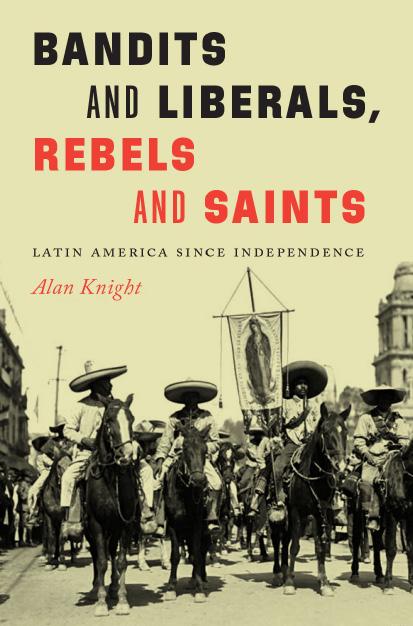
MAY 456 pp. • 6 x 9 • 1 illustration, 1 table, index $99.00X • hardcover • 978-1-4962-2942-7 $125.00 Canadian / £79.00 UK $35.00S • paperback • 978-1-4962-2978-6 $44.00 Canadian / £26.99 UK
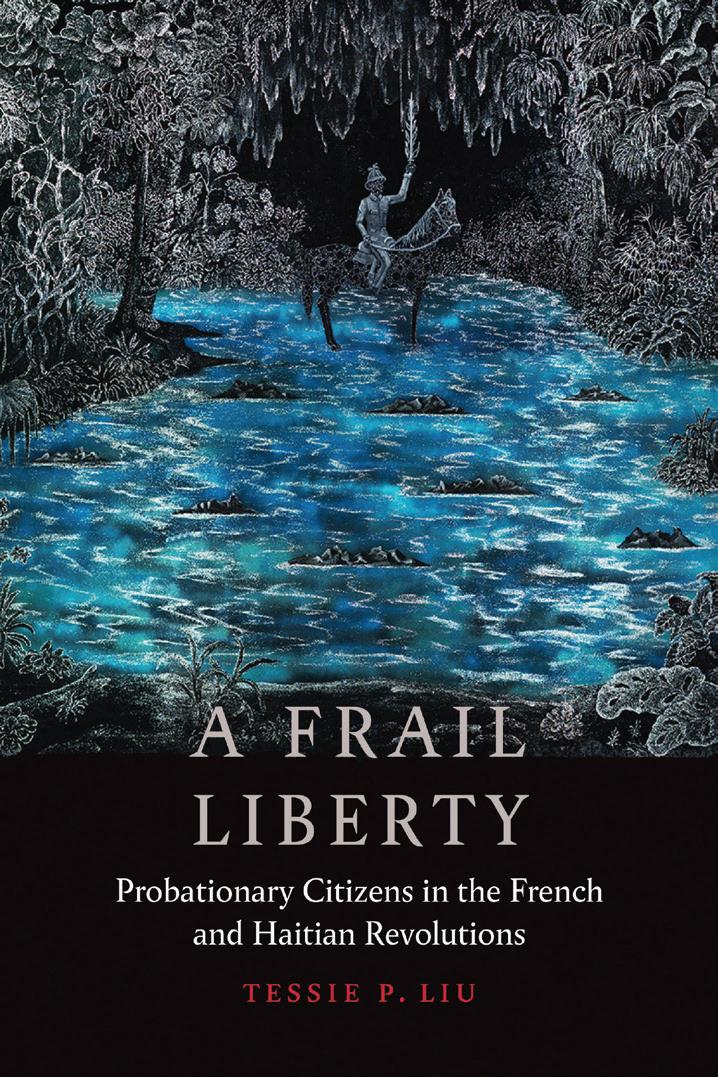
Tessie P. Liu is an associate professor of history and of gender and sexuality studies at Northwestern University. She is the author of e Weaver’s Knot: e Contradictions of Class Struggle and Family Solidarity in Western France, 1750–1914 and coeditor of Gendered Colonialisms in African History.
A Frail Liberty
TESSIE P. LIU
A Frail Liberty traces the paradoxical actions of the rst French abolitionist society, the Société des Amis des Noirs (Society of the Friends of Blacks), at the juncture of two unprecedented achievements of the revolutionary era: the extension of full rights of citizenship to qualifying free men of color in 1792 and the emancipation decree of 1794 that simultaneously declared the formerly enslaved to be citizens of France. is society helped form the revolution’s notion of color-blind equality yet did not protest the pro-slavery attack on the new citizens of France. Tessie P. Liu prioritizes the understanding of the elite insiders’ vision of equality as crucial to understanding this dualism.
By documenting the link between outright exclusion and political inclusion and emphasizing that a nation’s perceived quali cations for citizenship formulate a particular conception of racial equality, Liu argues that the treatment and status distinctions between free people of color and the formerly enslaved parallel the infamous divide between “active” and “passive” citizens. ese two populations of colonial citizens with African ancestry then must be considered part of the normative operations of French citizenship at the time. Uniquely locating racial di erentiation in the French and Haitian revolutions within the logic and structures of political representation, Liu deepens the conversation regarding race as a civic identity within democratic societies.
JULY 468 pp. • 6 x 9 • 14 illustrations, 1 map, index $65.00X • hardcover • 978-1-4962-2729-4 $82.00 Canadian / £52.00 UK
“Important. . . . A Frail Liberty further complicates our understanding of republican citizenship in revolutionary France by focusing on colonialism, race, and merit.”—Erica Johnson Edwards, author of Philanthropy and Race in the Haitian Revolution
France Overseas: Studies in Empire and Decolonization A. J. B. Johnston, James D. Le Sueur, and Tyler Stovall, series editors
“Tessie Liu brings new insights to two major events in French and world history, the French Revolution and the Haitian Revolution, and uses these histories to explore broader questions of democracy, political representation, and race. Moreover, Liu uses colonial history to illustrate and ultimately reshape how we see the history of metropolitan France. This is an outstanding work of scholarship: original, thought provoking, thoroughly researched, and well argued.” —Tyler Stovall, coeditor of The Black Populations of France: Histories from Metropole to Colony
A Civil Society
e Public Space of Freemason Women in France, 1744–1944
JAMES SMITH ALLEN
A Civil Society explores the struggle to initiate women as full participants in the masonic brotherhood that shared in the rise of France’s civil society and its “civic morality” on behalf of women’s rights. As a vital component of the third sector during France’s modernization, freemasonry empowered women in complex social networks, contributing to a more liberal republic, a more open society, and a more engaged public culture.
James Smith Allen shows that although women initially met with sti resistance, their induction into the brotherhood was a signi cant step in the development of French civil society, including the promotion of women’s rights in the late nineteenth century. Pulling together the many gendered facets of masonry, Allen draws from periodicals, memoirs, and archival material to account for the rise of women within the masonic brotherhood in the context of rapid historical change. anks to women’s social networks and their attendant social capital, masonry came to play a leading role in French civil society and the rethinking of gender relations in the public sphere.
“James Smith Allen presents readers with an engaging, kaleidoscopic account of the uphill and contentious struggle to include select women as full participants in the arcane brotherhood of French freemasonry.”—Karen O en, author of Debating the Woman Question in the French Third Republic, 1870–1920
“A Civil Society is important because it connects the activism and writing of major figures in French women’s history with masonic networks and impulses. It accomplishes all of this by providing copious evidence presented with clarity.”—Bonnie G. Smith, author of Women in World History: 1450 to the Present
“In this ambitious new study, James Smith Allen seeks to understand how masonic sisters and their fellow travelers contributed to a more liberal republic and open society and engaged civic culture in the Old Regime and modern France. A Civil Society is a welcome addition to all those interested in the history of sociability, progressive politics, and civil society.”—Kenneth Loiselle, author of Brotherly Love: Freemasonry and Male Friendship in Enlightenment France James Smith Allen is professor emeritus of history at Southern Illinois University Carbondale. He is the author of several books, including Poignant Relations: ree Modern French Women and In e Public Eye: A History of Reading in Modern France, 1800–1940, and the editor of In the Solitude of My Soul: e Diary of Geneviève Bréton, 1867–1871.
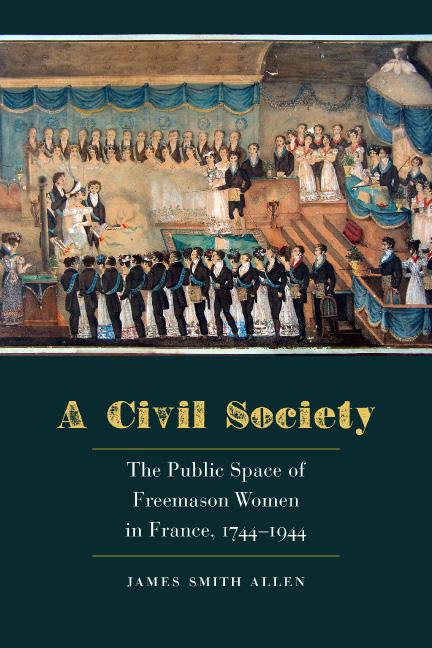
MAY 420 pp. • 6 x 9 • 2 photographs, 8 illustrations, 1 map, 3 graphs, 1 table, 8 appendixes, index $70.00X • hardcover • 978-1-4962-2778-2 $88.50 Canadian / £56.00 UK
SETTLEMENT, CULTURE, AND IDENTITY-MAKING AMONG U.S. AMERICANS IN COSTA RICA, 1945–1980 ATALIA SHRAGAI

Atalia Shragai is a lecturer of history at the Kibbutzim College of Education in Tel Aviv, Israel.

MAY 330 pp. • 6 x 9 • 8 photographs, 8 illustrations, 1 map, 2 tables, index $99.00X • hardcover • 978-1-4962-2030-1 $125.00 Canadian / £79.00 UK $30.00S • paperback • 978-1-4962-3079-9 $38.00 Canadian / £22.99 UK
Cold War Paradise
ATALIA SHRAGAI
In the wake of the Cold War, a diverse group of U.S. immigrants ocked to Costa Rica, distancing themselves from undesirable U.S. policies at home and abroad. Enchanted with Costa Rica’s natural beauty and lured by the prospect of cheap land, these expatriates—former government employees, businessmen and privileged bourgeois, dissident Quakers and self-seeking hippies, farmers and ecologists— sought a new life in a country that was often dubbed the Switzerland of Central America.
Cold War Paradise is a social and cultural history of this little-studied immigration ow. Based on extensive oral histories of these immigrants and their diverse writings, ranging from women’s club cookbooks to personal letters, Atalia Shragai examines the motivations for immigration, patterns of movement, settlements, and processes of identity-making among U.S. Americans in Costa Rica from post–World War II to the late 1970s. Exploring such diverse themes as gender, nature, and material culture, this study provides a fresh perspective on inter-American relations from the point of view of ordinary U.S. emigrants and settlers. Shragai traces the formation and evolution of a wide range of identi cations among U.S. expats and the varied ways they reconstructed and represented their individual and collective histories within the broader scheme of the U.S. presence in Cold War Central America.
“A critical intervention in global studies. Analyzing the migration of U.S. citizens to Costa Rica in search of a deterritorialized American Dream, Atalia Shragai challenges how we think about topics like diaspora, gender, and the natural world. With its creative use of oral history and ethnography, Shragai shows how new sources and methods can change our understandings of the past.”—Je rey Lesser, Samuel Candler Dobbs Professor and director of the Halle Institute for Global Research at Emory University
“A strong contribution to oral history and to the history of identity from an ethnographic perspective.”—David Díaz Arias, professor of history at the Universidad de Costa Rica
“A fascinating look at U.S. citizens living in Costa Rica during the Cold War. . . . Packed with interesting details and grounded in timely theoretical perspectives, this carefully researched book makes a valuable contribution to the growing scholarship on lifestyle migration specifically and global migration more generally.”—Sheila Croucher, professor of global and intercultural studies at Miami University
CULTURAL CRITICISM / PHILOSOPHY / GENDER & SEXUALITY STUDIES / LGBTQ STUDIES Hatred of Sex
OLIVER DAVIS AND TIM DEAN
Hatred of Sex links Jacques Rancière’s political philosophy of the constitutive disorder of democracy with Jean Laplanche’s identi cation of a fundamental perturbation at the heart of human sexuality. Sex is hated as well as desired, Oliver Davis and Tim Dean contend, because sexual intensity impedes coherent selfhood and undermines identity, rendering us all a little more deplorable than we might wish. Davis and Dean explore the consequences of this con icted dynamic across a range of elds and institutions, including queer studies, attachment theory, the #MeToo movement, and “traumatology,” demonstrating how hatred of sex has been optimized and exploited by neoliberalism.
Advancing strong claims about sex, pleasure, power, intersectionality, therapy, and governance, Davis and Dean shed new light on enduring questions of equality at a historical moment when democracy appears ever more precarious.
“Fascinating, formidable, and timely, this volume probes unexpected links between democracy and sexuality. Hatred of Sex will undoubtedly disturb established ideas that are widely and at times too reflexively adopted in current academic conversations about sexuality. A manifesto grounded in careful scholarship, this book has the makings of a classic.”—Avgi Saketopoulou, faculty of the Postdoctoral Program in Psychotherapy and Psychoanalysis at New York University
“Hatred of Sex is a bold critical intervention. . . . No other book has o ered such an unapologetic and persuasive critique of the incursion of anti-democratic and sex-hating discourses in queer theory. Davis and Dean make arguments that few others would dare to wage.” —John Paul Ricco, professor of comparative literature at the University of Toronto Oliver Davis is a professor of French studies at the University of Warwick. He is the author of Jacques Rancière and editor of Rancière Now. Tim Dean is James M. Benson Professor in English at the University of Illinois at Urbana-Champaign. He is the author of Unlimited Intimacy: Re ections on the Subculture of Barebacking and Beyond Sexuality.

APRIL 196 pp. • 5 x 8 $20.00S • paperback • 978-1-4962-3059-1 $25.50 Canadian / £14.99 UK
Provocations Marco Abel and Roland Végső, series editors
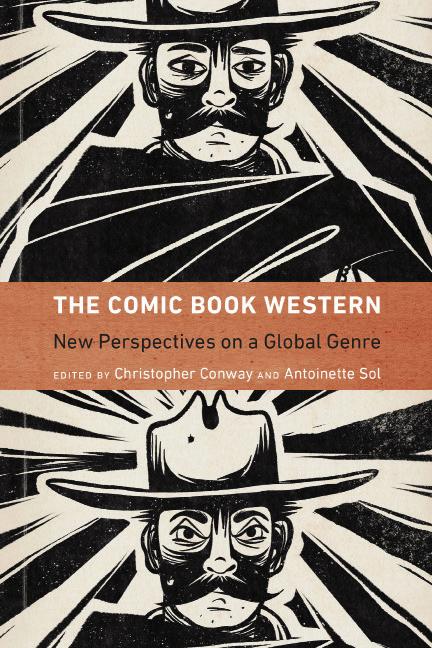
Christopher Conway is a professor of Spanish at the University of Texas at Arlington. He is the author or editor of several books, including Heroes of the Borderlands: e Western in Mexican Film, Comics, and Music. Antoinette Sol is a professor of French at the University of Texas at Arlington and coeditor of MLA’s Teaching Representations of the French Revolution.
e Comic Book Western
New Perspectives on a Global Genre
EDITED BY CHRISTOPHER CONWAY AND ANTOINETTE SOL
One of the greatest untold stories about the globalization of the Western is the key role of comics. Few American cultural exports have been as successful globally as the Western, a phenomenon commonly attributed to the widespread circulation of ction, lm, and television. e Comic Book Western centers comics in the Western’s international success. Even as readers consumed translations of American comic book Westerns, they fell in love with local ones that became national or international sensations. ese essays reveal the unexpected cross-pollinations that allowed the Western to emerge from and speak to a wide range of historical and cultural contexts, including Spanish and Italian fascism, Polish historical memory, the ideology of shōjo manga from Japan, British post-apocalypticism and the Gothic, race and identity in Canada, Mexican gender politics, French critiques of manifest destiny, and gaucho nationalism in Argentina. e vibrant themes uncovered in e Comic Book Western teach us that international comic book Westerns are not hollow imitations but complex and aesthetically powerful statements about identity, culture, and politics.
“Masterfully organized and expansive in scope, The Comic Book Western brings together diverse perspectives on the global reach of Western comics. Simply a must-read for readers interested in popular culture, frontier myths, and the transnational life of cultural goods.” —William Acree, author of Staging Frontiers: The Making of Modern Popular Culture in Argentina and Uruguay
JUNE 342 pp. • 6 x 9 • 34 gures, index $99.00X • hardcover • 978-1-4962-1899-5 $125.00 Canadian / £79.00 UK $30.00S • paperback • 978-1-4962-3164-2 $38.00 Canadian / £22.99 UK
“Creators outside the United States have restaged the Western’s themes to explore their own culture and politics since the beginning of comics. This volume is especially welcome because it looks at the importance of translation, transcreation, adoption, reterritorialization, and hybridity in relation to global comic studies.”—Flavia Brizio-Skov, author of Ride the Frontier: Exploring the Myth of the American West on Screen
Postwestern Horizons William R. Handley, series general editor
“The assembled scholars beautifully trace how the oftoverlooked Western comic is truly adventurous, engaging, critical, and vital for any study of transnational and global comics today.”—Nhora Lucía Serrano, editor of Immigrants and Comics: Graphic Spaces of Remembrance, Transaction, and Mimesis
Slow Narrative and Nonhuman Materialities
MARCO CARACCIOLO
Slow Narrative and Nonhuman Materialities investigates how the experience of slowness in contemporary narrative practices can create a vision of interconnectedness between human communities and the nonhuman world. Here, slowness is not a matter of measurable time but a transformative experience for audiences of contemporary narratives engaging with the ecological crisis. While climate change is a scienti c abstraction, the imagination of slowness turns it into a deeply embodied and a ective experience. Marco Caracciolo explores the value of slowness in dialogue with a wide range of narratives in various media, from prose ction to comic books to video games. He argues that we need patience and an eye for complex patterns in order to recognize the multiple threads that link human communities and the slow-moving processes of climate and geological history. Decelerating attention o ers important insight into human societies’ relations with the nonhuman materialities of Earth’s physical landscapes, ecosystems, and atmosphere.
Caracciolo centers the experiential e ects of narrative and o ers a range of theoretically grounded readings that complement the formal language of narrative theory. ese close readings demonstrate that slowness is not a matter of measurable time but a “thickening” of attention that reveals the deeply multithreaded nature of reality. e importance of this realization cannot be overstated: through an investment in the here and now of experience, slow narrative can help us manage the uncertainty of living in an era marked by dramatically shifting climate patterns.
“Slow Narrative and Nonhuman Materialities makes an important contribution to the linked fields of ecocriticism, contemporary cultural works, narratology, and new materialisms. . . . To make his case Caracciolo lays out the debates in these fields with sometimes startling clarity. He has a wonderful knack for the economic distillation of complex arguments—and his book exhibits a wide and deft knowledge of the fields he addresses.”—Barbara Leckie, author of Open Houses: Poverty, the Novel, and the Architectural Idea in Nineteenth-Century Britain Marco Caracciolo is an associate professor of English and literary theory at Ghent University in Belgium. He is the author of Strange Narrators in Contemporary Fiction: Explorations in Readers’ Engagement with Characters (Nebraska, 2016) and Narrating the Mesh: Form and Story in the Anthropocene.
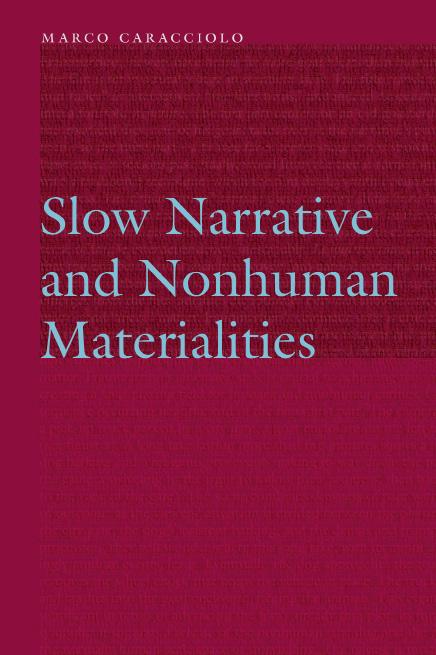
MARCH 264 pp. • 6 x 9 • 2 photographs, 15 illustrations, index $60.00X • hardcover • 978-1-4962-2909-0 $76.00 Canadian / £48.00 UK
Frontiers of Narrative Jesse E. Matz, series editor
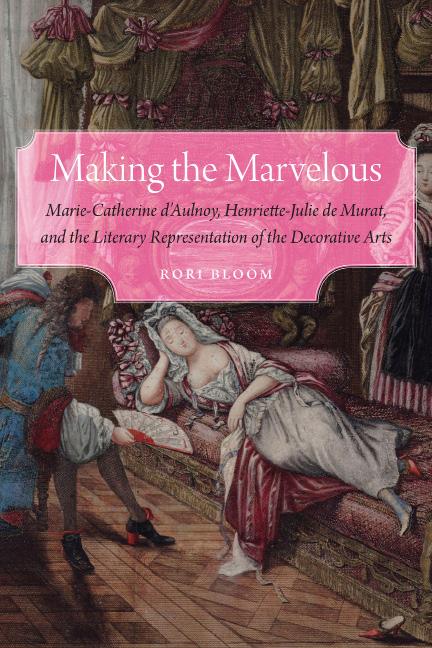
Rori Bloom is an associate professor of French at the University of Florida. She is the author of Man of Quality, Man of Letters: e Abbé Prévost between Novel and Newspaper.
JUNE 254 pp. • 6 x 9 • 1 appendix, index $65.00X • hardcover • 978-1-4962-2267-1 $82.00 Canadian / £52.00 UK
Making the Marvelous
Marie-Catherine d’Aulnoy, Henriette-Julie de Murat, and the Literary Representation of the Decorative Arts
RORI BLOOM
At a moment when France was coming to new prominence in the production of furniture and fashion, the fairy tales of Marie-Catherine d’Aulnoy (1652–1705) and HenrietteJulie de Murat (1670–1716) gave pride of place to richly detailed descriptions of palaces, gardens, clothing, and toys. rough close readings of these authors’ descriptive prose, Rori Bloom shows how these practitioners of a supposedly minor genre made a major contribution as chroniclers and critics of the decorative arts in Old Regime France. Identifying these authors’ embrace of the pretty and the playful as a response to a frequent critique of fairy tales as childish and feminine, Making the Marvelous demonstrates their integration of artisan’s work, child’s play, and the lady’s toilette into a complex vision of creativity. D’Aulnoy and Murat changed the stakes of the fairy tale, Bloom argues: instead of inviting their readers to marvel at the magic that changes rags to riches, they enjoined them to acknowledge the skill that transforms raw materials into beautiful works of art.
“Clearly argued, carefully crafted, and finely detailed, this book is a real gem. It o ers a fresh look at the works of d’Aulnoy and Murat by highlighting their embrace of ornament and artful materiality and brilliantly demonstrates the modernity and sophistication of their writing.”—Volker Schröder, associate professor of French at Princeton University
“Rori Bloom’s fascinating new approach to reading d’Aulnoy’s and Murat’s fiction focuses on descriptions and shows that the craftsmanship in the decorative arts informs the marvelous and functions as an analogy between the visual arts and the authors’ own verbal craft.”—Charlotte Trinquet du Lys, associate professor of French and a liate professor of women and gender studies and medieval and Renaissance studies at the University of Central Florida
Early Modern Cultural Studies Carole Levin and Marguerite A. Tassi, series editors
“Compelling. . . . By focusing on the artistic processes at work (as opposed to simply the finished product) and how d’Aulnoy and Murat shape their fairy tales as art—as fashionable accessories—Making the Marvelous sheds new light on the early modern fairy tales penned by women.”—Anne E. Duggan, author of Salonnières, Furies, and Fairies: The Politics of Gender and Cultural Change in Absolutist France
EARLY MODERN STUDIES / WOMEN, GENDER & SEXUALITY / LITERARY CRITICISM Feminist Formalism and Early Modern Women’s Writing
Readings, Conversations, Pedagogies
EDITED AND WITH AN INTRODUCTION BY LARA DODDS AND MICHELLE M. DOWD
Feminist Formalism and Early Modern Women’s Writing reexamines the relationship between gender and form in early modern women’s writing in essays that elaborate the speci c literary strategies of women writers, that examine women’s debts to and appropriations of di erent literary genres, and that o er practical suggestions for the teaching of women’s texts in several di erent contexts. Contributors explore the possibility of feminist formalism, a methodology that both attends to the structural, rhetorical, and other formal techniques of a given text and takes gender as a central category of analysis. is collection contends that feminist formalism is a useful tool for scholars of the early modern period and for literary studies more broadly because it marries the traditional questions of formalism, including questions of style, genre, and literary history—with the political and cultural concerns of feminist inquiry.
Contributors reposition works by important women writers—such as Margaret Cavendish, Hester Pulter, Mary Wroth, and Katherine Philips—as central to the development of English literary tradition. By examining a variety of texts written by women, including recipes, emblems, exchanges, and poetry, Feminist Formalism and Early Modern Women’s Writing contributes to existing scholarship on early modern women’s writing while extending it in new and important directions. Lara Dodds is a professor of English at Mississippi State University. She is the author of e Literary Invention of Margaret Cavendish. Michelle M. Dowd is Hudson Strode Professor of English at the University of Alabama. She is the author of e Dynamics of Inheritance on the Shakespearean Stage and Women’s Work in Early Modern English Literature and Culture.
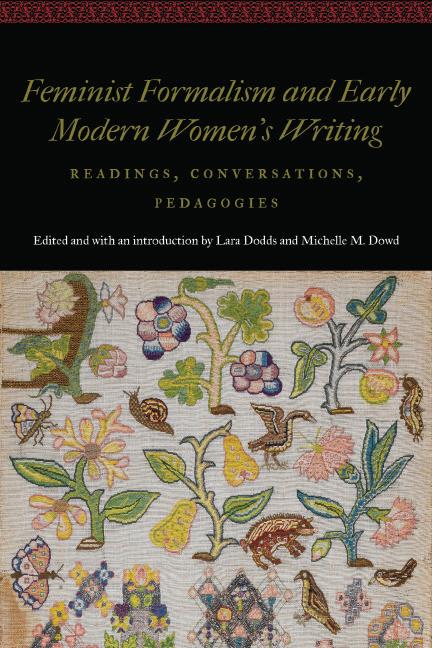
“A feminist formalist is exactly what is needed at this moment to integrate the study of early modern women writers into the literary canon. All of the contributions are clearly written and highly readable, and the entire collection is a pleasure to read, without exception. . . . The pedagogy section of this collection o ers useful, practical advice. This groundbreaking collection is both brilliant and necessary. It will find a wide audience among researchers, teachers, and students.” —Paula McQuade, author of Catechisms and Women’s Writing in Seventeenth-Century England MAY 310 pp. • 6 x 9 • 4 photographs, 2 illustrations, index $60.00X • hardcover • 978-1-4962-2042-4 $76.00 Canadian / £48.00 UK
Women and Gender in the Early Modern World Allyson Poska and Abby Zanger, series editors
“A significant and particularly timely contribution to the field of early modern women’s writing.”—Patricia Phillippy, editor of A History of Early Modern Women’s Writing
